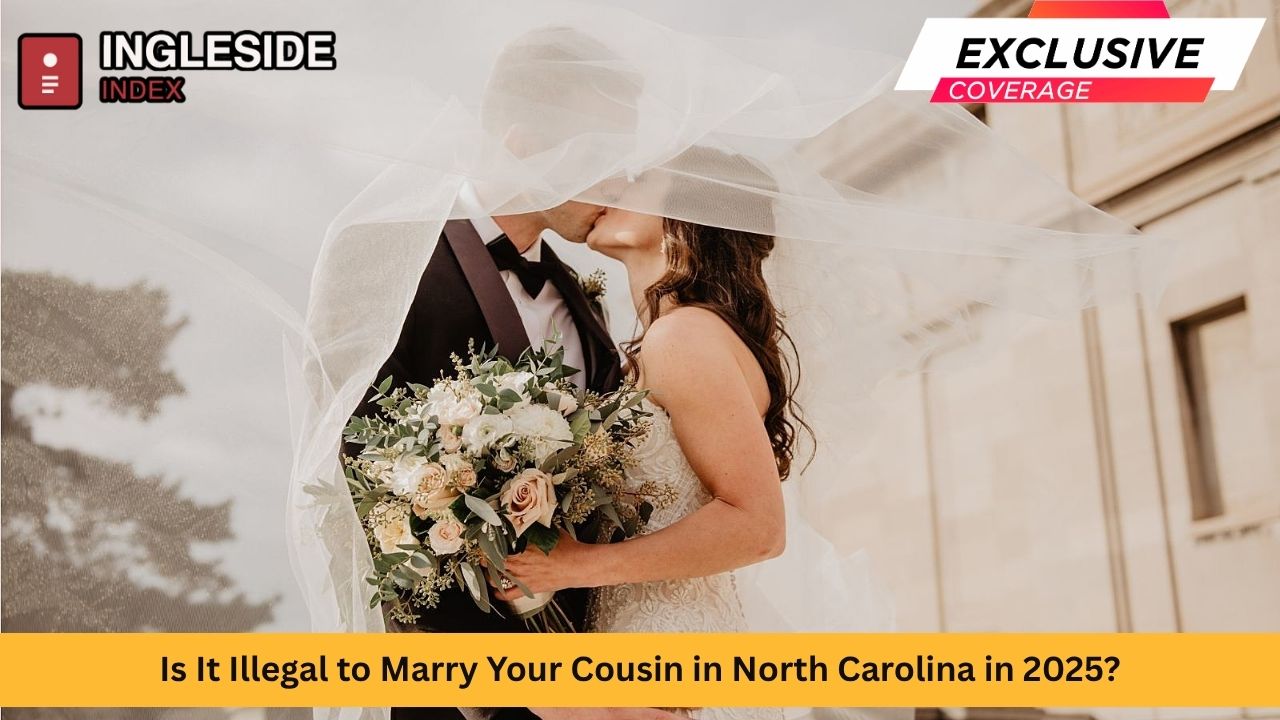Marriage laws in the United States have always reflected the evolving attitudes of society. Among the most discussed and sometimes misunderstood topics is whether cousins can legally marry. In North Carolina, the issue isn’t just about tradition or family values—it’s a matter of law, history, and personal choice. If you’re in Charlotte or Raleigh and considering marrying your cousin, or simply curious about the law, this guide provides a comprehensive look at what’s permitted by North Carolina law in 2025.
Understanding Cousin Marriage in the United States
Across the 50 states, the legal status of cousin marriage varies widely. While marriage to close relatives such as siblings or parents is universally prohibited, the rules regarding cousin marriage are much more nuanced.
-
Eighteen states, including North Carolina, allow first cousin marriage.
-
Twenty-four states prohibit it entirely.
-
The remaining states permit it only under special circumstances, such as advanced age or infertility.
Despite its legality in several places, cousin marriage remains relatively rare. Nationwide, less than 0.2% of all marriages are between people who are second cousins or closer, which translates to roughly 250,000 people in such unions across the country.
North Carolina’s Law on Cousin Marriage
The Legal Language
North Carolina law is clear when it comes to cousin marriage. The statutes prohibit marriage between closer relatives such as siblings, parents, and children, but explicitly allow first cousins to marry. The law, however, draws the line at so-called “double first cousins.”
What Are Double First Cousins?
Double first cousins share both sets of grandparents, usually because two sisters married two brothers. In North Carolina, marriages between double first cousins are not permitted. This distinction sets North Carolina apart from most other states that address cousin marriage, as the laws here are more specific than an outright ban or acceptance.
Marriage License Application Process
If you and your first cousin wish to marry in North Carolina, you can apply for a marriage license at any county register of deeds office. This includes major urban centers like Winston-Salem and Greensboro, as well as in smaller rural counties. Both parties must be at least 18 (or meet the requirements for minors), and there is no residency requirement, meaning people from out of state can legally marry in North Carolina as long as they follow the state’s protocols.
Historical Context and Why the Law Exists
Cultural and Societal Origins
Historically, cousin marriage was commonplace in many societies, including colonial America. With time, societal attitudes shifted, influenced by advances in genetics, changing migration patterns, and evolving norms around family and community. Laws developed to reflect both the scientific understanding of genetics and prevailing cultural attitudes.
The Science Behind Cousin Marriage
Modern science shows that the risk of birth defects for children of first cousins is slightly higher than for unrelated couples, but not at the catastrophic levels once believed. For context:
-
The average risk of birth defects in the general population is about 3-4%.
-
For first cousins, that risk rises to around 4-6%.
This modest increase informs many laws that now focus more on direct lineage (such as siblings or parents) than on cousin marriage. In North Carolina, lawmakers have combined this scientific understanding with respect for personal choice, except in the unique case of double first cousins.
Social and Demographic Realities
How Common Is Cousin Marriage in North Carolina?
While cousin marriage is legal, it is rare in practice. North Carolina reflects the broader American trend, with cousin marriages making up a tiny fraction of nuptials each year. In major cities like Charlotte, Durham, and Asheville, cousin marriages are rarely recorded in the public record.
In the United States, this rarity is attributed to cultural norms rather than legal restriction in states where the practice is permitted.
Modern Attitudes in Urban and Rural North Carolina
Urban areas such as Raleigh and Wilmington tend to be more cosmopolitan, with diverse populations and changing family structures. Here, cousin marriage is seldom practiced or discussed.
In contrast, North Carolina’s rural communities, particularly in the western mountains or along the eastern seaboard, may have more conservative attitudes about family relationships; however, cousin marriage remains uncommon even in these regions.
The Legal Process for Marriage in North Carolina
Requirements for Marriage
Anyone looking to marry in North Carolina, including first cousins, must:
-
Apply for a marriage license at the local register of deeds.
-
Provide proof of age and identity.
-
Confirm the absence of closer kinship than cousins (no siblings, parent-child, uncle-niece, etc.).
-
Pay the associated application fee.
No blood tests or genetic counseling are required for cousins to marry in North Carolina. That contrasts with states like Maine, where cousins must agree to genetic counseling before marrying.
Marriage Ceremony and Official Recognition
Couples can choose to wed through a civil or religious ceremony. Marriage licenses are valid anywhere in the state, whether you choose a church in Fayetteville or a city hall in Greenville. Once married, the union is legally recognized by the state, with all attendant legal rights and responsibilities.
What About Out-of-State Recognition?
If a couple marries legally as first cousins in North Carolina and then moves to a state where cousin marriage is prohibited, the validity of their marriage depends on the laws of the receiving state. Some states explicitly recognize marriages valid where performed, while others may not.
North Carolina’s Cities and Distinct Marriage Trends
A Closer Look at Major Cities
Let’s see how some of North Carolina’s most populous cities fit into this conversation about cousin marriage laws and family structure:
-
Charlotte: As the state’s largest city and a major financial hub, Charlotte is culturally diverse. Marriage license offices here report that cousin marriages are exceedingly rare. Most residents are unaware that cousin marriage is legal.
-
Raleigh: The capital city, known for its universities and tech industry, is home to a young, highly-educated population. Marriage trends here mirror national patterns, with first marriages happening later in life.
-
Greensboro and Winston-Salem: Located in the Piedmont Triad, these cities have diverse populations and family structures. Cousin marriage appears almost nonexistent.
-
Fayetteville: With its strong military presence (thanks to Fort Liberty), the city reflects mobility and diversity, with cousin marriage cases virtually unheard of in public records.
-
Asheville: In the scenic western part of the state, Asheville is known for its arts and culture scene. Life in Asheville is progressive on many fronts, but cousin marriage remains an obscure legal possibility rather than a tradition.
Urban vs. Rural Marriage Patterns
In rural parts of the state, tradition and close-knit community ties influence marriage customs, but the trend against cousin marriage holds strong. Most people, regardless of geography, seek partners outside their immediate family circle, and “keeping it in the family” isn’t a common practice.
Comparative Perspective: North Carolina and Neighboring States
Looking regionally, how does North Carolina stack up against its neighbors when it comes to cousin marriage laws?
| State | First Cousin Marriage | Notes |
|---|---|---|
| North Carolina | Legal* | Except for double first cousins |
| South Carolina | Legal | |
| Virginia | Legal | |
| Georgia | Legal | |
| Tennessee | Conditional | Permitted only for some categories |
| Florida | Legal |
*Double first cousins cannot marry in North Carolina; in other states, this distinction is often not made.
This regional snapshot explains why someone living near the border—say, in Hendersonville or Elizabeth City—might choose to get married in North Carolina if their home state restricts cousin marriage.
Myths, Taboos, and Modern Realities
Unpacking the Stigma
Despite its legality, cousin marriage carries a significant social taboo. Films, literature, and local lore often depict it as something unusual or ethically problematic. In reality, laws are more nuanced, and cousin marriage is globally common—in some cultures as much as 10-20% of all marriages are between cousins.
The Real Motives for Cousin Marriage
While rare, there are personal and cultural reasons why some choose to marry their cousin:
-
Preserving family ties and inheritance
-
Strengthening familial alliances in certain cultures
-
Longstanding personal bonds, especially in small or isolated communities
Still, in bustling urban centers like Cary or Concord, these situations are the exception, not the rule.
Health, Genetics, and Cousin Marriage
Scientific Perspective
Current medical consensus is that the slightly elevated risk of recessive genetic disorders for children of first cousins does not warrant an outright ban, though genetic counseling may be encouraged for peace of mind.
-
General population risk for birth defects: ~3-4%.
-
First cousin couples risk: ~4-6%.
-
Risk for unrelated partners: similar to women over 40 having children.
Such minimal risk has led states like North Carolina to allow personal choice when forming family structures, with only the rare exception of double first cousins.
North Carolina’s Approach
No laws in North Carolina require genetic counseling or testing for cousin couples. This laissez-faire attitude aligns the state with a handful of others that allow individuals to make their own reproductive and marital choices.
Marriage, Family Trends, and Changing Norms in North Carolina
Later Marriages, Diverse Partnerships
Across North Carolina, the age at which individuals marry has been steadily rising, mirroring nationwide trends. In the 2010s and 2020s, many people in cities like Durham and Wilmington are more likely to wait until their late twenties or early thirties to marry, and cohabitation before marriage is increasingly common.
Population Stats and Marital Status
-
About half of North Carolina adults over 16 are currently married.
-
Cohabitation is becoming more frequent, especially among younger adults.
-
Divorce rates are comparable to the national average, but family structures are increasingly diverse, with blended families and remarriages becoming common.
Frequently Asked Questions About Cousin Marriage in North Carolina
Is it legal to marry your cousin in North Carolina?
Yes, first cousin marriage is fully legal in North Carolina except in the rare case of double first cousins.
Are there residency requirements for cousin marriage?
No. Anyone, regardless of residency, may marry their cousin in North Carolina if both parties qualify.
What is a double first cousin, and why can’t they marry?
A double first cousin is someone who shares both sets of grandparents with their cousin. North Carolina law prohibits such unions because the genetic similarity is akin to that of half-siblings.
Is cousin marriage common in North Carolina?
No. The practice is rare and not widely discussed or publicized.
Do laws vary by city or county within North Carolina?
No. Marriage laws are set by the state legislature and are uniform across the state, whether you’re in Chapel Hill, Jacksonville, or a rural county.
The Future of Cousin Marriage Law in North Carolina
Legislative Stability
As of 2025, there are no signs of significant changes to North Carolina’s marriage statutes regarding cousins. Lawmakers appear satisfied with the current stance, balancing public health, individual rights, and the rare but real cases of cousin relationships.
Societal Shifts
With population diversity increasing, especially in cities like Durham and Charlotte, public attention is more focused on other pressing family law topics. Cousin marriage, while legal, is mainly a curiosity or an obscure legal fact for most North Carolinians.
Conclusion: What You Need to Know
In 2025, it is entirely legal for first cousins to get married in North Carolina, provided they are not double first cousins. From the bustling streets of Charlotte to quiet towns like Boone or Brevard, the law is consistent and straightforward.
-
North Carolina stands among eighteen U.S. states permitting first cousin marriage, with its own distinctive restriction on double first cousins.
-
The practice is rare, reflecting both modern scientific understanding and social preferences.
-
Legal processes are simple, inclusive, and apply equally across every city and county in the state.
For those considering such a union, or simply exploring family law, North Carolina welcomes you with clarity and legal certainty—provided you meet the requirements and the relationship does not fall into the double first cousin exception. As with all matters of marriage, personal choice and respect for the law go hand in hand in the Tar Heel State.




